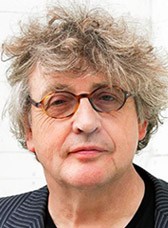Paul Muldoon is a celebrated poet, professor of poetry, scholar, critic, arts activist, and translator. His work has received recognition nationally and internationally. Author of twelve collections of poetry, Muldoon is the Howard G.B. Clark '21 University Professor in the Humanities at Princeton University.
Paul Muldoon was born in County Armagh, Northern Ireland and raised near a village called The Moy. In his early twenties, he became a producer for the BBC in Belfast, but eventually gave up the job to become a freelance writer. He moved to the United States and has taught at Princeton University since 1987. He has been poetry editor of The New Yorker since 2007. Muldoon has been described by The Times Literary Supplement as "the most significant English-language poet born since the second World War." Roger Rosenblatt, writing in The New York Times Book Review, described Muldoon as "one of the great poets of the past hundred years, who can be everything in his poems - word-playful, lyrical, hilarious, melancholy. And angry. Only Yeats before him could write with such measured fury."
Paul Muldoon’s poetry collections include One Thousand Things Worth Knowing (2015), Maggot (2010), Horse Latitudes (2006), Moy Sand and Gravel (2002), Hay (1998), The Annals of Chile (1994), Madoc: A Mystery (1990), Meeting the British (1987), Quoof (1983), Why Brownlee Left (1980), Mules (1997), and New Weather (1973). His Selected Poems, 1968-2014 was recently published (Farrar, Straus and Giroux, 2016). Muldoon’s essays and criticism are collected in The End of the Poem, Oxford Lectures (Farrar, Straus and Giroux, 2006) and To Ireland, I The 1998 Clarendon Lectures (Oxford, 2000). He has also edited and introduced several anthologies of Irish Folk Tales and published innumerable smaller collections, works of criticism, opera libretti, books for children, song lyrics, and radio and television dramas. Muldoon is also a songwriter and has a band that performs with special guests to sell-out audiences at an event he hosts and curates in New York called Muldoon’s Picnic, An omnium-gatherum of words and music.
Muldoon’s poems use word-play and humor to tackle the deadly serious. They speak of the quotidian, as well as the impenetrable: articulating great joy, pain, loss. Some of his poems are imaginative forays into the past, other poems are remarkable elegies to his close friends, his mother, his mentor and friend the Nobel Laureate Seamus Heaney. His poetry has been translated into twenty languages.
In addition to the Pulitzer Prize, Paul Muldoon has received an American Academy of Arts and Letters award in literature, a Guggenheim Fellowship, the T. S. Eliot Prize, the Griffin International Prize for Excellence in Poetry, the Shakespeare Prize, the Aspen Prize for Poetry, and the European Prize for Poetry. He is a Fellow of the Royal Society of Literature, the American Academy of Arts and Sciences, and the American Academy of Arts and Letters.


